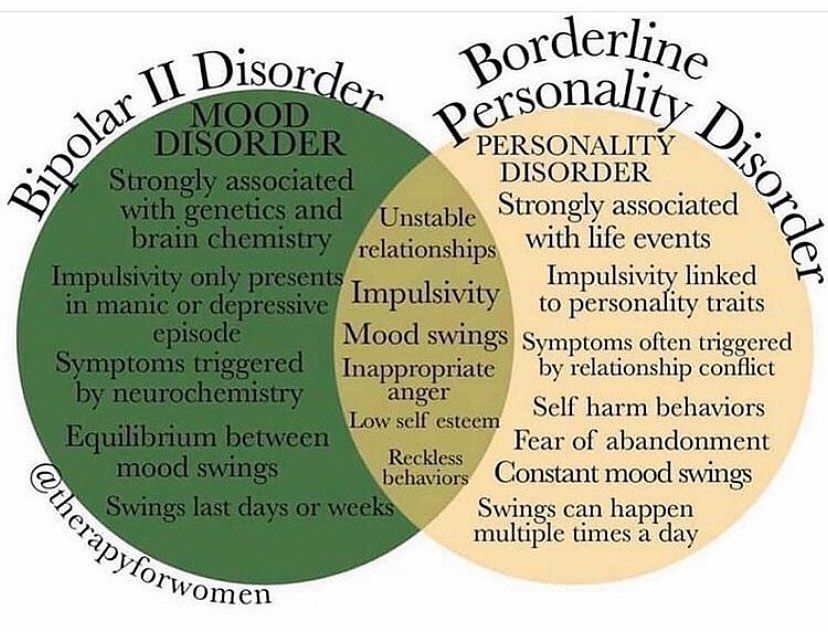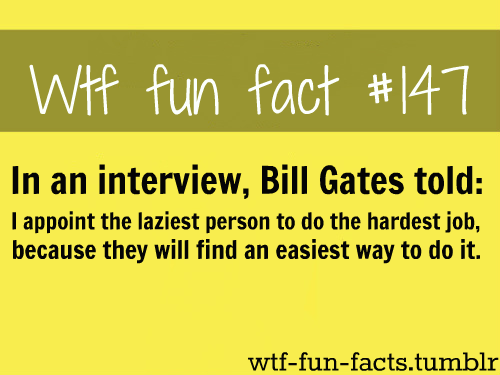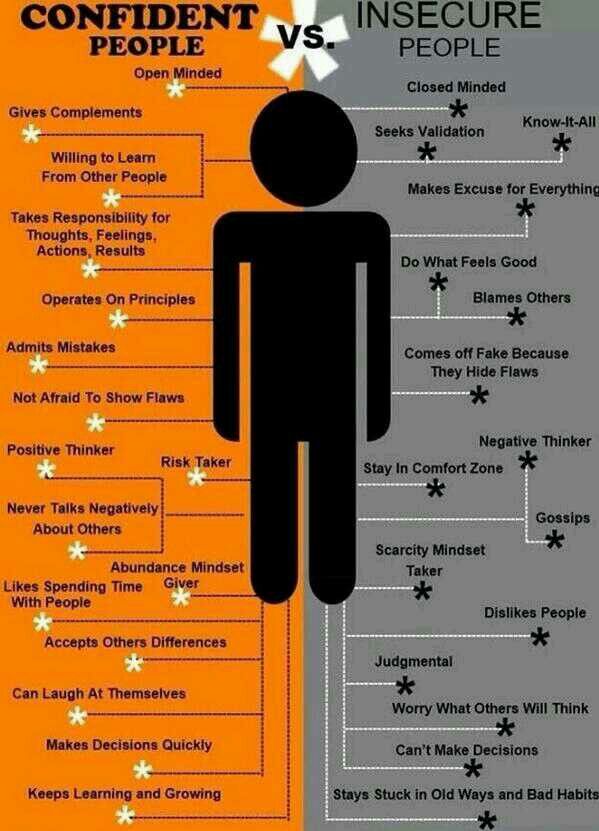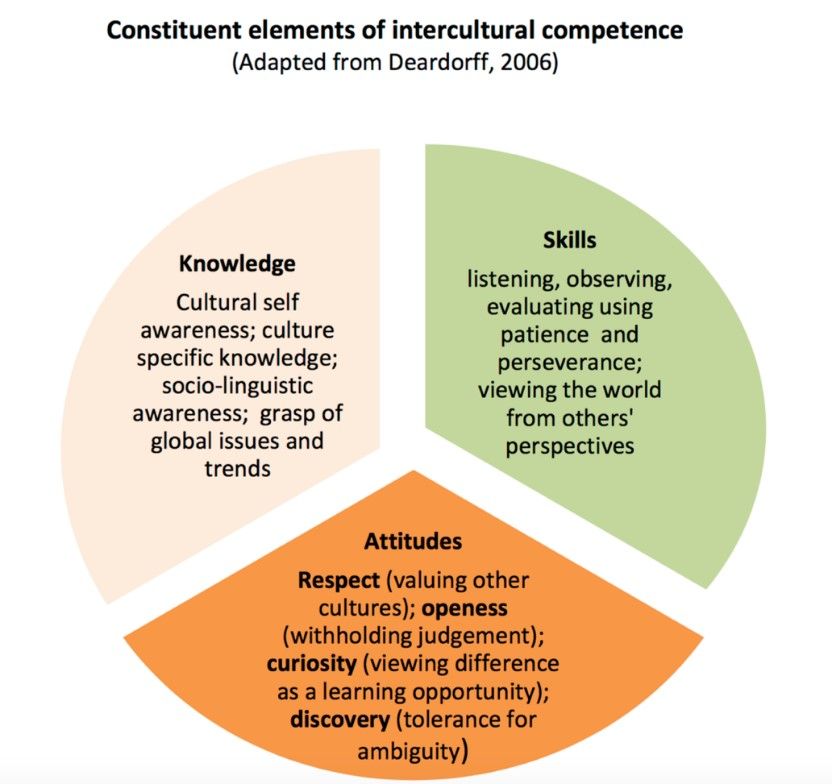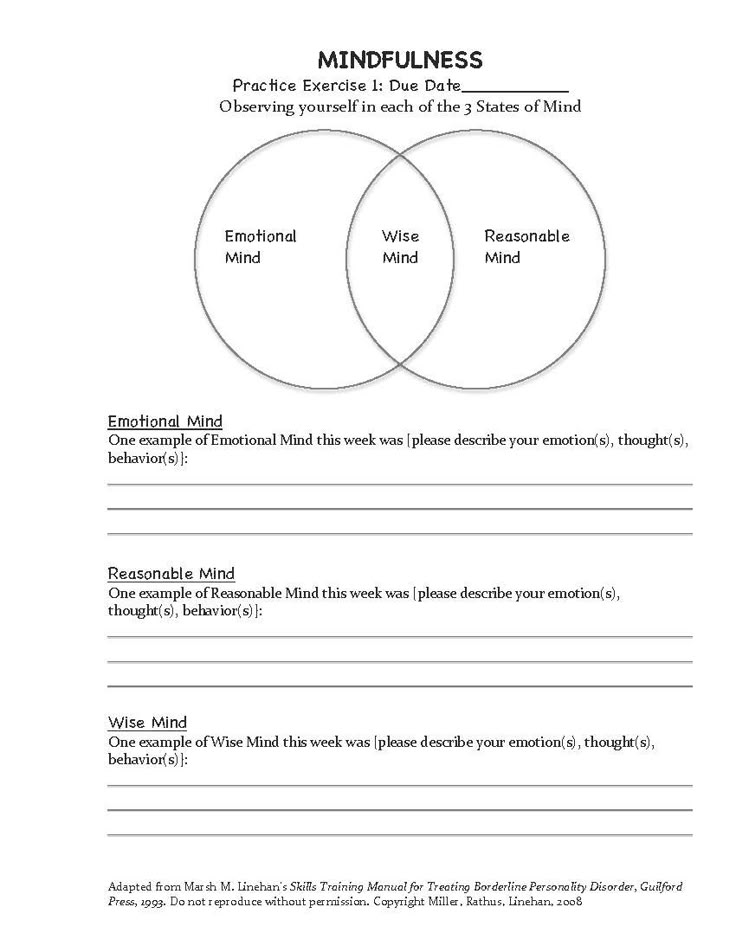The four horsemen marriage counseling
Criticism, Contempt, Defensiveness, & Stonewalling
Being able to identify the Four Horsemen in your conflict discussions is a necessary first step to eliminating them and replacing them with healthy, productive communication patterns.
Being able to identify the Four Horsemen in your conflict discussions is a necessary first step to eliminating them and replacing them with healthy, productive communication patterns.
Being able to identify the Four Horsemen in your conflict discussions is a necessary first step to eliminating them and replacing them with healthy, productive communication patterns.
The Four Horsemen of the Apocalypse is a metaphor depicting the end of times in the New Testament. They describe conquest, war, hunger, and death respectively. We use this metaphor to describe communication styles that, according to our research, can predict the end of a relationship.
1. Criticism
The first horseman is criticism. Criticizing your partner is different than offering a critique or voicing a complaint. The latter two are about specific issues, whereas the former is an ad hominem attack. It is an attack on your partner at the core of their character. In effect, you are dismantling their whole being when you criticize.
The important thing is to learn the difference between expressing a complaint and criticizing:
- Complaint: “I was scared when you were running late and didn’t call me. I thought we had agreed that we would do that for each other.”
- Criticism: “You never think about how your behavior is affecting other people. I don’t believe you are that forgetful, you’re just selfish.
 You never think of others! You never think of me!”
You never think of others! You never think of me!”
If you find that you and your partner are critical of each other, don’t assume your relationship is doomed to fail. The problem with criticism is that, when it becomes pervasive, it paves the way for the other, far deadlier horsemen to follow. It makes the victim feel assaulted, rejected, and hurt, and often causes the perpetrator and victim to fall into an escalating pattern where the first horseman reappears with greater and greater frequency and intensity, which eventually leads to contempt.
2. Contempt
The second horseman is contempt. When we communicate in this state, we are truly mean—we treat others with disrespect, mock them with sarcasm, ridicule, call them names, and mimic or use body language such as eye-rolling or scoffing. The target of contempt is made to feel despised and worthless.
Contempt goes far beyond criticism. While criticism attacks your partner’s character, contempt assumes a position of moral superiority over them:
“You’re ‘tired?’ Cry me a river.
I’ve been with the kids all day, running around like mad to keep this house going and all you do when you come home from work is flop down on that sofa like a child and play those idiotic video games. I don’t have time to deal with another kid. Could you be any more pathetic?”
Research even shows that couples that are contemptuous of each other are more likely to suffer from infectious illness (colds, the flu, etc.) than others due to weakened immune systems! Contempt is fueled by long-simmering negative thoughts about the partner—which come to a head when the perpetrator attacks the accused from a position of relative superiority.
Most importantly, contempt is the single greatest predictor of divorce. It must be eliminated.
Relevant Products
Sale! View Details Sale! View DetailsGottman Relationship Adviser
$199.00 Gottman Relationship Coach: How to Make Your Relationship Work
$79.00
Learn what to do when the destructive Four Horsemen enter your relationship.
The Gottman Relationship Adviser, the world’s first complete relationship wellness tool for couples takes the guesswork out of improving your relationship. Measure your relationship health with a research-based self-assessment, then receive a tailored digital relationship plan proven to heal and strengthen your connection.
How can you know you’re in a happy relationship that’s both good for your health and everyone around you? Can such a thing be measured? It can! Take this free quiz and find out how well you know your partner.
Free Relationship Quiz
3. Defensiveness
The third horseman is defensiveness, and it is typically a response to criticism. We’ve all been defensive, and this horseman is nearly omnipresent when relationships are on the rocks. When we feel unjustly accused, we fish for excuses and play the innocent victim so that our partner will back off.
When we feel unjustly accused, we fish for excuses and play the innocent victim so that our partner will back off.
Unfortunately, this strategy is almost never successful. Our excuses just tell our partner that we don’t take their concerns seriously and that we won’t take responsibility for our mistakes:
- Question: “Did you call Betty and Ralph to let them know that we’re not coming tonight as you promised this morning?”
- Defensive response: “I was just too darn busy today. As a matter of fact, you know just how busy my schedule was. Why didn’t you just do it?”
This partner not only responds defensively, but they reverse blame in an attempt to make it the other partner’s fault. Instead, a non-defensive response can express acceptance of responsibility, admission of fault, and understanding of your partner’s perspective:
“Oops, I forgot. I should have asked you this morning to do it because I knew my day would be packed.
That’s my fault. Let me call them right now.”
Although it is perfectly understandable to defend yourself if you’re stressed out and feeling attacked, this approach will not have the desired effect. Defensiveness will only escalate the conflict if the critical spouse does not back down or apologize. This is because defensiveness is really a way of blaming your partner, and it won’t allow for healthy conflict management.
4. Stonewalling
The fourth horseman is stonewalling, which is usually a response to contempt. Stonewalling occurs when the listener withdraws from the interaction, shuts down, and simply stops responding to their partner. Rather than confronting the issues with their partner, people who stonewall can make evasive maneuvers such as tuning out, turning away, acting busy, or engaging in obsessive or distracting behaviors.
It takes time for the negativity created by the first three horsemen to become overwhelming enough that stonewalling becomes an understandable “out,” but when it does, it frequently becomes a bad habit.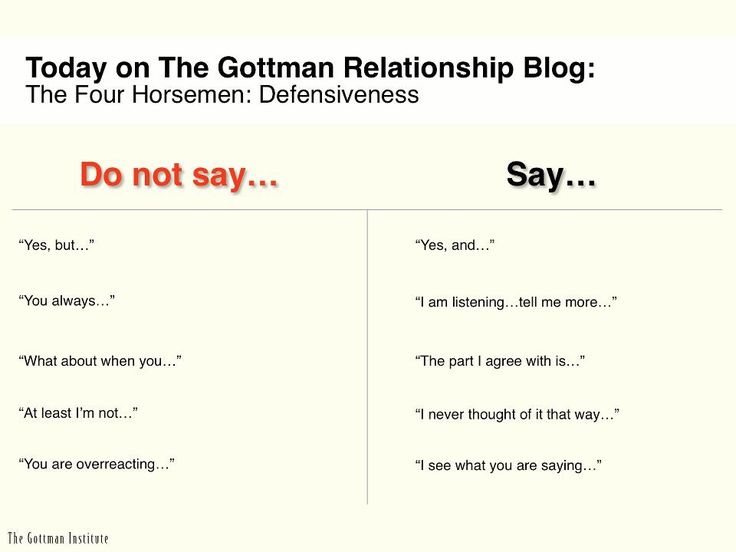 And unfortunately, stonewalling isn’t easy to stop. It is a result of feeling physiologically flooded, and when we stonewall, we may not even be in a physiological state where we can discuss things rationally.
And unfortunately, stonewalling isn’t easy to stop. It is a result of feeling physiologically flooded, and when we stonewall, we may not even be in a physiological state where we can discuss things rationally.
If you feel like you’re stonewalling during a conflict, stop the discussion and ask your partner to take a break:
“Alright, I’m feeling too angry to keep talking about this. Can we please take a break and come back to it in a bit? It’ll be easier to work through this after I’ve calmed down.”
Then take 20 minutes to do something alone that soothes you—read a book or magazine, take a walk, go for a run, really, just do anything that helps to stop feeling flooded—and then return to the conversation once you feel ready.
The Antidotes to the Four Horsemen
Being able to identify the Four Horsemen in your conflict discussions is a necessary first step to eliminating them, but this knowledge is not enough. To drive away destructive communication and conflict patterns, you must replace them with healthy, productive ones.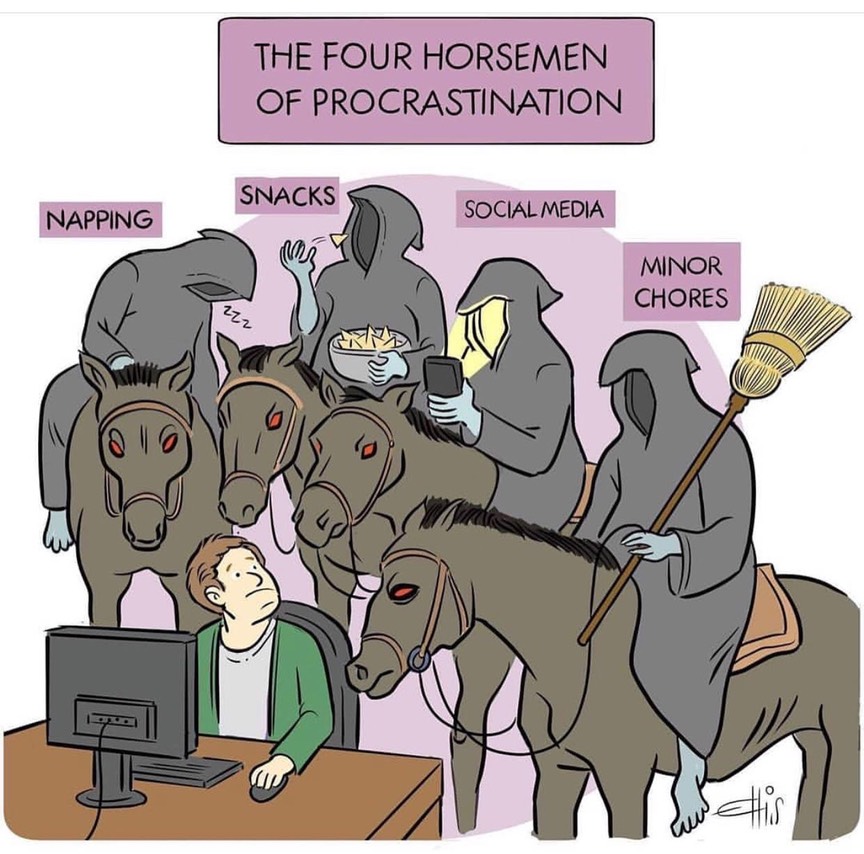
Fortunately, each horseman has a proven positive behavior that will counteract negativity. Click here to learn about the antidotes.
You Might Also Like
View this post on Instagram
A post shared by The Gottman Institute (@gottmaninstitute)
The Marriage Minute
New to the Gottman Method? The Marriage Minute is a twice-a-week check in from The Gottman Institute with key principles that will improve your relationship in 60 seconds or less. More than 50 years of research with thousands of couples proves a simple fact: small things often can create big changes over time. Got a minute? Sign up below.
Ellie Lisitsa
Ellie Lisitsa is a former staff writer at The Gottman Institute and editor for The Gottman Relationship Blog. ="wpforms-"]
="wpforms-"]
The Four Horsemen: The Antidotes
Luckily, for every Horseman of the Apocalypse, there is an antidote.
Luckily, for every Horseman of the Apocalypse, there is an antidote.
Luckily, for every Horseman of the Apocalypse, there is an antidote.
All relationships, even the most successful ones, have conflict. It is unavoidable. Fortunately, our research shows that it’s not the appearance of conflict, but rather how it’s managed that predicts the success or failure of a relationship. We say “manage” conflict rather than “resolve,” because relationship conflict is natural and has functional, positive aspects that provide opportunities for growth and understanding.
And there are problems that you just won’t solve due to natural personality differences between you and your partner, but if you can learn to manage those problems in a healthy way, then your relationship will succeed.
The first step in effectively managing conflict is to identify and counteract The Four Horsemen when they arrive in your conflict discussions. If you don’t, you risk serious problems in the future of your relationship. But, like Newton’s Third Law, for every horseman there is an antidote, and you can learn how and when to use them below.
If you don’t, you risk serious problems in the future of your relationship. But, like Newton’s Third Law, for every horseman there is an antidote, and you can learn how and when to use them below.
You can download a free PDF version of the The Four Horsemen and Their Antidotes here.
The Antidote to Criticism: Gentle Start-Up
A complaint focuses on a specific behavior, but criticism attacks a person’s very character. The antidote for criticism is to complain without blame by using a soft or gentle start-up. Avoid saying “you,” which can indicate blame, and instead talk about your feelings using “I” statements and express what you need in a positive way.
To put it simply, think of these two things to formulate your soft start-up: What do I feel? What do I need?
Criticism: “You always talk about yourself. Why are you always so selfish?”
Antidote: “I’m feeling left out of our talk tonight and I need to vent.
Can we please talk about my day?”
Notice that the antidote starts with “I feel,” leads into “I need,” and then respectfully asks to fulfill that need. There’s no blame or criticism, which prevents the discussion from escalating into an argument.
The Antidote to Contempt: Build a Culture of Appreciation and Respect
Contempt shows up in statements that come from a position of moral superiority. Some examples of contempt include sarcasm, cynicism, name-calling, eye-rolling, sneering, mockery, and hostile humor. Contempt is destructive and defeating. It is the greatest predictor of divorce, and it must be avoided at all costs.
The antidote to contempt is to build a culture of appreciation and respect in your relationship, and there are a few ways to do that. One of our mottos is Small Things Often: if you regularly express appreciation, gratitude, affection, and respect for your partner, you’ll create a positive perspective in your relationship that acts as a buffer for negative feelings. The more positive you feel, the less likely that you’ll feel or express contempt!
The more positive you feel, the less likely that you’ll feel or express contempt!
Another way that we explain this is our discovery of the 5:1 “magic ratio” of positive to negative interactions that a relationship must have to succeed. If you have five or more positive interactions for every one negative interaction, then you’re making regular deposits into your emotional bank account, which keeps your relationship in the green.
Contempt: “You forgot to load the dishwasher again? Ugh. You are so incredibly lazy.” (Rolls eyes.)
Antidote: “I understand that you’ve been busy lately, but could you please remember to load the dishwasher when I work late? I’d appreciate it.”
The antidote here works so well because it expresses understanding right off the bat. This partner shows how they know that the lack of cleanliness isn’t out of laziness or malice, and so they do not make a contemptuous statement about their partner or take any position of moral superiority.
Instead, this antidote is a respectful request, and it ends with a statement of appreciation.
Learn what to do when the destructive Four Horsemen enter your relationship
Sale! View Details Sale! View DetailsGottman Relationship Adviser
$199.00 Gottman Relationship Coach: How to Make Your Relationship Work
$79.00
The Gottman Relationship Adviser, the world’s first complete relationship wellness tool for couples, takes the guesswork out of improving your relationship. Measure your relationship health with a research-based self-assessment, then receive a tailored digital relationship plan proven to heal and strengthen your connection.
The Antidote to Defensiveness: Take Responsibility
Defensiveness is defined as self-protection in the form of righteous indignation or innocent victimhood in attempt to ward off a perceived attack. Many people become defensive when they are being criticized, but the problem is that being defensive never helps to solve the problem at hand.
Defensiveness is really a way of blaming your partner. You’re saying that the problem isn’t me, it’s you. As a result, the problem is not resolved and the conflict escalates further. The antidote is to accept responsibility, even if only for part of the conflict.
Defensiveness: “It’s not my fault that we’re going to be late. It’s your fault since you always get dressed at the last second.”
Antidote: “I don’t like being late, but you’re right. We don’t always have to leave so early. I can be a little more flexible.”
By taking responsibility for part of the conflict (trying to leave too early), even while asserting that they don’t like to be late, this partner prevents the conflict from escalating by admitting their role in the conflict. From here, this couple can work towards a compromise.
From here, this couple can work towards a compromise.
The Antidote to Stonewalling: Physiological Self-Soothing
Stonewalling is when someone completely withdraws from a conflict discussion and no longer responds to their partner. It usually happens when you’re feeling flooded or emotionally overwhelmed, so your reaction is to shut down, stop talking, and disengage. And when couples stonewall, they’re under a lot of emotional pressure, which increases heart rates, releases stress hormones into the bloodstream, and can even trigger a fight-or-flight response.
In one of our longitudinal research studies, we interrupted couples after fifteen minutes of an argument and told them we needed to adjust the equipment. We asked them not to talk about their issue, but just to read magazines for half an hour. When they started talking again, their heart rates were significantly lower and their interaction was more positive and productive.
What happened during that half hour? Each partner, without even knowing it, physiologically soothed themselves by reading and avoiding discussion.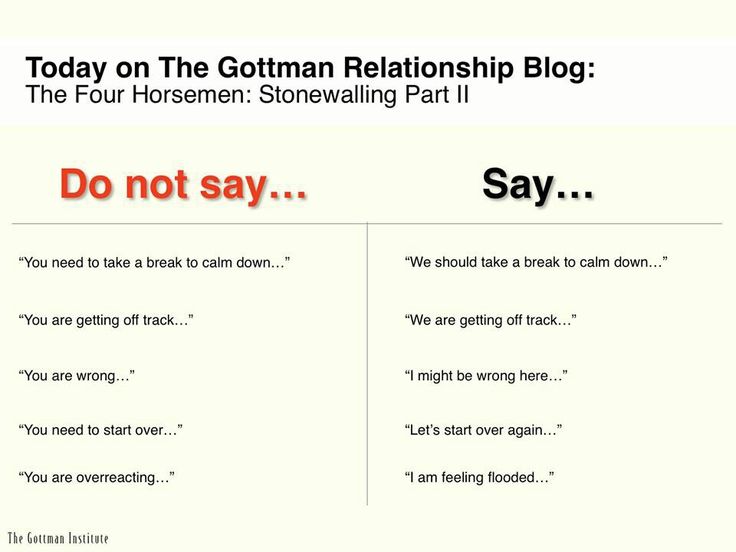 They calmed down, and once they felt calm, they were able to return to the discussion in a respectful and rational way.
They calmed down, and once they felt calm, they were able to return to the discussion in a respectful and rational way.
Therefore, the antidote to stonewalling is to practice physiological self-soothing, and the first step of self-soothing is to stop the conflict discussion and call a timeout:
“Look, we’ve been through this over and over again. I’m tired of reminding you—”
“Honey, I’m sorry to interrupt you, but I’m feeling overwhelmed and I need to take a break. Can you give me twenty minutes and then we can talk?”
If you don’t take a break, you’ll find yourself either stonewalling and bottling up your emotions, or you’ll end up exploding at your partner, or both, and neither will get you anywhere good.
So, when you take a break, it should last at least twenty minutes because it will take that long before your body physiologically calms down. It’s crucial that during this time you avoid thoughts of righteous indignation (“I don’t have to take this anymore”) and innocent victimhood (“Why is he always picking on me?”). Spend your time doing something soothing and distracting, like listening to music, reading, or exercising. It doesn’t really matter what you do, as long as it helps you to calm down.
Spend your time doing something soothing and distracting, like listening to music, reading, or exercising. It doesn’t really matter what you do, as long as it helps you to calm down.
You’ve got the skills. Use them!
Now that you know what the Four Horsemen are and how to counteract them with their proven antidotes, you’ve got the essential tools to manage conflict in a healthy way. As soon as you see criticism or contempt galloping in, remember their antidotes. Be vigilant. The more you can keep the Four Horsemen at bay, the more likely you are to have a stable and happy relationship.
The Gottman Relationship Adviser, the world’s first complete relationship wellness tool for couples, takes the guesswork out of improving your relationship. Measure your relationship health with a research-based self-assessment, then receive a tailored digital relationship plan proven to heal and strengthen your connection.
For an in-depth analysis of your relationship health, check out the Gottman Assessment, a virtual relationship evaluation tool for couples. ="wpforms-"]
="wpforms-"]
They will destroy your marriage: 4 "horsemen of the Apocalypse" who undermine the family from the inside
Conflicts happen in any family. Someone copes with them on their own, someone turns to specialists for help. But even they are not always able to help.
Well-known psychologist John Gottman, author of the book "7 Principles of a Happy Marriage, or Emotional Intelligence in Love", names four features in the communication of partners that are so destructive for relationships that they can be compared to the horsemen of the Apocalypse, bringing chaos and destruction.
Criticism
The psychologist warns against confusing it with complaints. You can complain to your mom that your husband forgot to take out the trash today. Or to friends that the wife squanders money. Yes, even to each other - but for a specific specific action! But the transition to personalities and character traits is already criticism.
Compare: “We agreed that you would take your daughter to school today. And you forgot and I had to make excuses for being late for work. This is a complaint, it focuses on a certain behavior.
And now we add the classic “You always…” and get criticism. "You always do only as you please and do not take into account my plans and deeds." Generalized, severely criticized and got a big scandal.
Contempt
As a rule, it comes immediately after criticism. Everything is logical, if you constantly look for flaws in a person, then you stop respecting him. And if there is no respect, contempt comes, which is manifested by irony and sarcasm. Moreover, the despising spouse does not hesitate to show evil humor even in public.
“What my wife does best is watching TV series and chatting with her girlfriends. If they gave an award for the fastest messages in instant messengers, she would definitely get it. The only pity is that her dexterity does not extend to household chores.
According to Gottman, contempt in any form is the worst of the four horsemen. It is almost impossible to resolve a family conflict if one of the spouses is barely holding back negativity and disgust towards the other. Irritable aggression can also be mixed with contempt.
Defensive reaction
It occurs in the second spouse in response to criticism and contempt. It seems that this is a natural reaction, but in fact, this is another dangerous feature. First, a person tries to explain himself, somehow justify himself. And then he goes on the attack, which he considers the best defense. To get away from other people's accusations, you need to express your own. It's like you're trying to say, "The problem isn't with me, it's with you."
“You say that I am not involved in raising my son! But I'm actually at work all day, and you spend a lot more time with him! Well, whose is it, it turns out, a bad upbringing? I just don’t have time to correct your mistakes, I provide for you, actually. ”
”
In fact, the attacking spouse will rarely take into account the arguments of the one who is defending. And such a reaction will only aggravate the conflict, because counter-accusations will appear.
Wall
Imagine that a discussion of some situation started with criticism, turned into contempt and led to a defensive reaction. This, in turn, provoked another criticism and again - defense.
So the spouses go around in a vicious circle, until one simply decides to “turn off” from toxic communication. He can be silent, sit in headphones, listen to music, make the TV louder. The more one shouts, the more demonstratively silent the other is. Instead of resisting, he retreats and "builds a wall".
By the way, this behavior is more typical for men. "Pokerface", a stone face, zero reactions - it seems that your words, in principle, do not interest him. Even if a hurricane is raging in his soul, you will not see it now. He isolated himself emotionally from the endless attacks.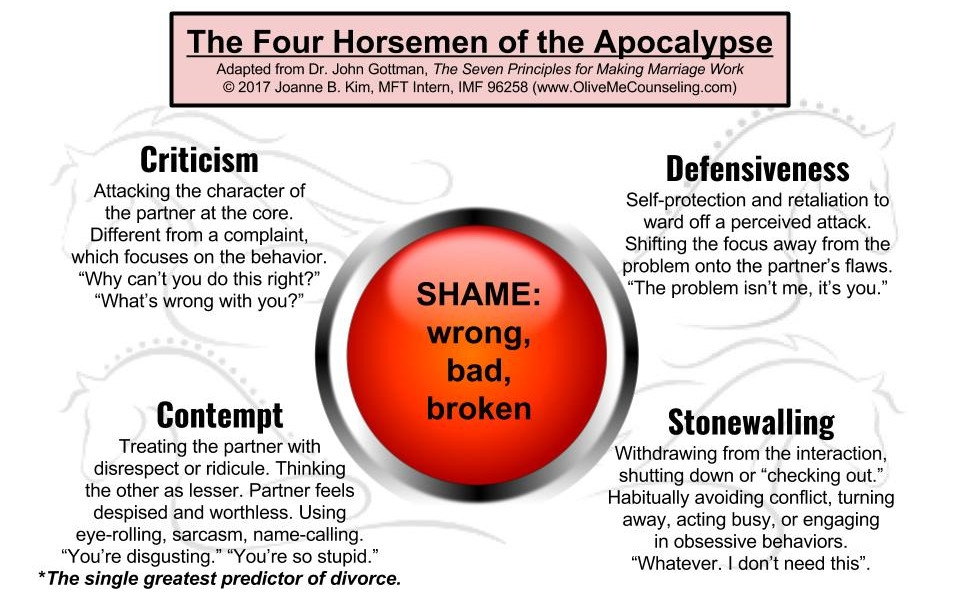
According to Gottman, the wall usually appears later than the other three horsemen, because the negativity they create takes time to take effect.
49. Family and marriage counseling.
family and marriage form of counseling psychotherapy focused on for a married couple, helps her in overcoming family conflicts and crisis situations, in achieving harmony in relationships, ensuring mutual satisfaction needs. She can work like an independent method and as a stage of family psychotherapy.
Work in progress either with a married couple or with one from the partners who came to the reception to a psychologist. With this option, marital psychotherapy with a psychologist are discussed not the problems of the spouse, but only those thoughts feelings, experiences that the complainant's concerns about his (her) matrimony.
AT currently in the practice of marital counseling is the most common dynamic, behavioral and humanistic approaches.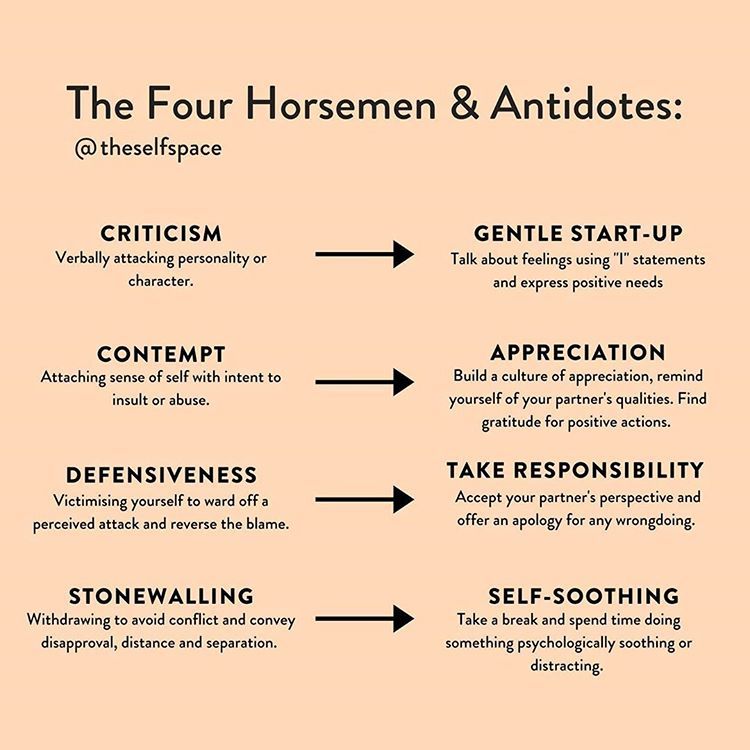
At dynamic approach matrimonial disharmony is viewed from the point of view view of intrinsic motivation of behavior both partners. Dynamics is traced interpersonal relationships and its relationship with dynamics of mental processes.
Aim behavioral approach in family and marriage counseling is, first in general, changing the behavior of partners, in this case, conditioning methods are used and training that provides:
one. Mutual positive management spouses' behaviour.
2. Acquisition of necessary social knowledge and skills, especially in communication and joint resolution of emerging problems.
3. Development and implementation of marital agreements to change their behavior.
behavioral direction in family and marriage counseling at present is the most common. Its most popular forms are the conclusion marital contracts, communicative trainings, constructive dispute, receptions problem solving, etc.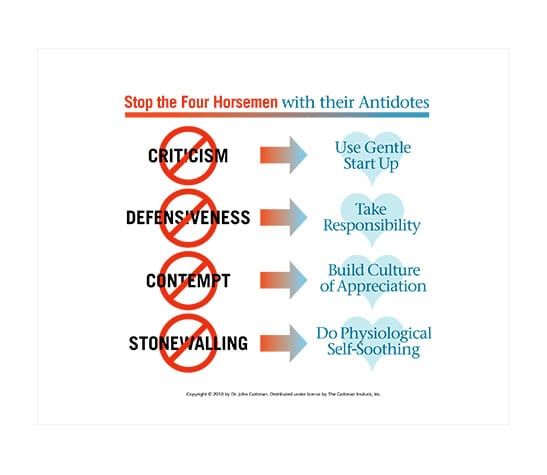 Currently many experts use integrative approach, combining more often total methods of cognitive-behavioral therapy and systemic psychotherapy.
Currently many experts use integrative approach, combining more often total methods of cognitive-behavioral therapy and systemic psychotherapy.
AT The contract is based on an agreement in which spouses clearly define their requirements in terms of behavior and taken circumstances. When formulating requirements, it is recommended to use next order: general complaints, then their concretization, further positive proposals, finally, an agreement with listing the responsibilities of each spouses.
AT humanistic approach to family and marriage counseling leaders are ideas about what is harmonious marriage lie openness, authenticity, tolerance, need in self-expression, belonging to another and independent development of the personality of each. This approach has evolved as the opposite dynamic, which is redundant focused on the influence of historical former spouse and his parental family, and too manipulative behavioral approach.
Here specialist creates conditions in which spouses tend to verbalize their feelings and thus to improvement mutual understanding.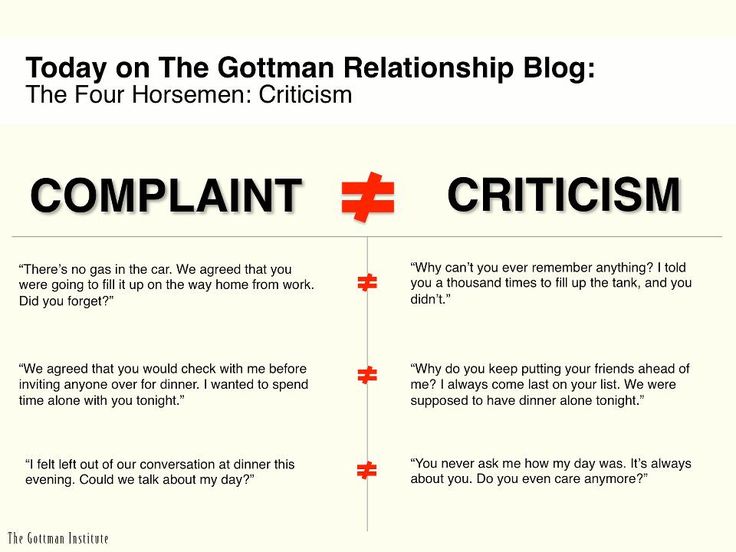 Were formulated principles of open marriage, creating the most favorable conditions for personal growth partners:
Were formulated principles of open marriage, creating the most favorable conditions for personal growth partners:
one. The principle of reality, "here and now";
2. Respect for the privacy of a partner;
3. Open communication is not "mind reading" another", but openly talk about their feelings and desires;
four. Mobility in the performance of family roles;
5. Equality, trust;
6. Authenticity - know yourself and your worth, value the right of another to live according to their ideas;
7. Open partnership - everyone has the right to own interests and hobbies.
outside depending on the approach counseling comes down to one goal - restoration or transformation relationships of spouses with each other and the world, development of the ability to understand each other and to form a full-fledged family We, flexibly regulating relations both inside families, as well as with various social groups.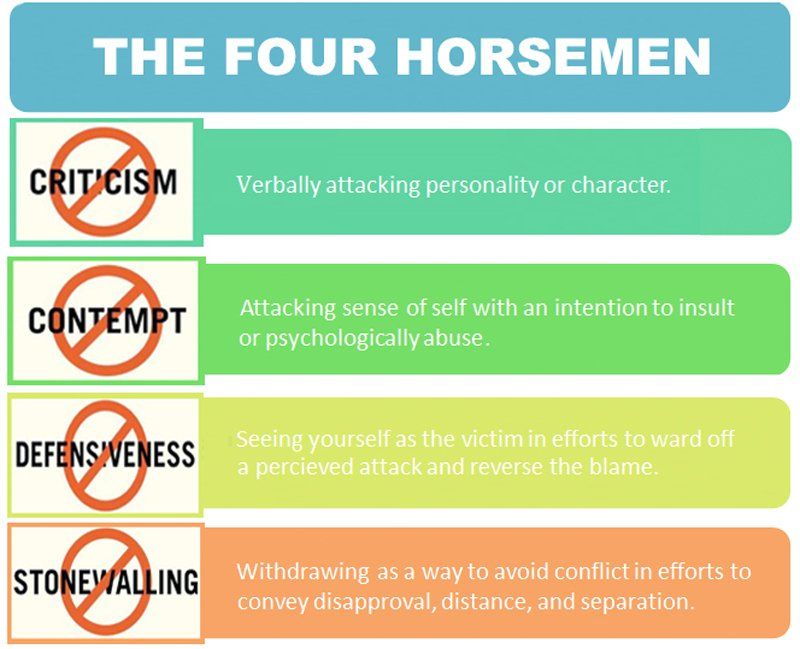
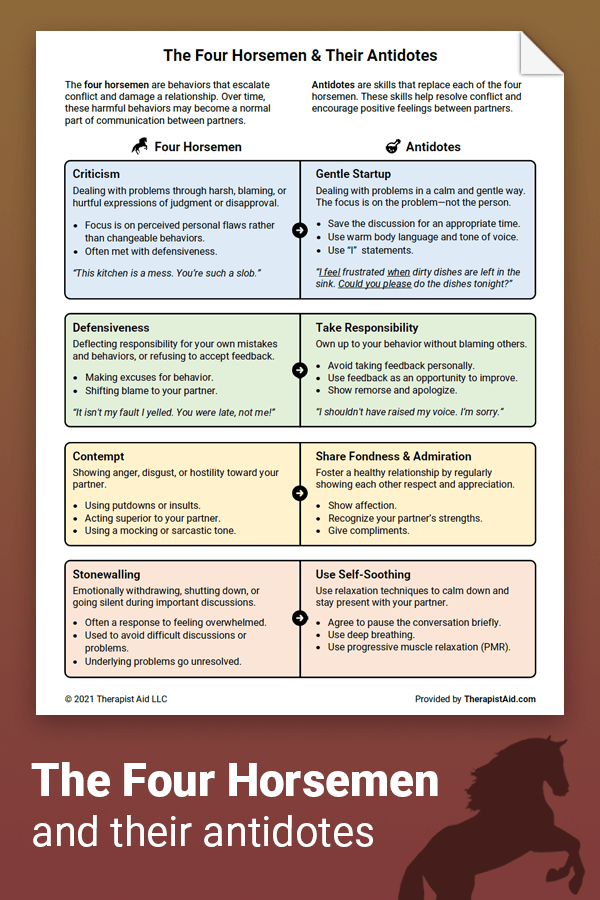 00
00

